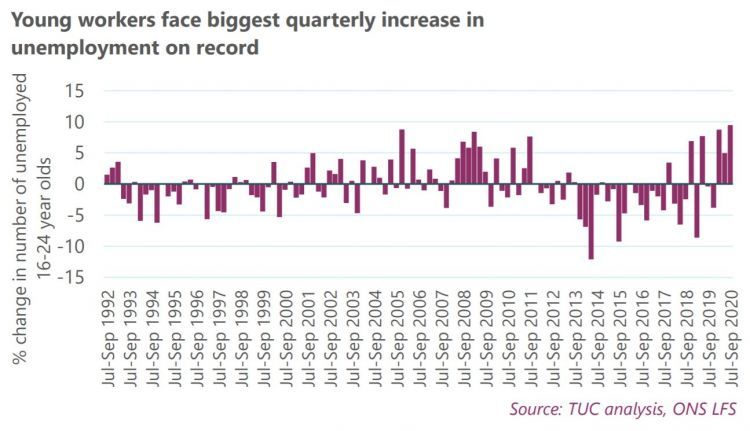Kickstart, the job creation scheme for young people, has to be a success
Young workers have been hit hard again by the economic impact of the Covid-19 crisis.
They have experienced the highest rates of redundancy, largest falls in employment, highest rates of furlough with reduced pay, largest falls in weekly pay, and the largest falls in hours worked.
Covid-19 has also meant significant job losses in sectors like hospitality and leisure which employ many young workers.

Kickstart employment scheme
Recognising our calls for support for young workers, the government introduced a new national £2 billion employment scheme for 16-24-year olds, called Kickstart.
The intention is to support around 250,000 jobs of six months for 16-24-year-olds who are on Universal Credit.
As soon as the Government announced the scheme in the summer – the TUC called for Kickstart to deliver:
-
Good quality jobs with training built in – so there must be a guarantee that young people get access to real training – and strict checks to ensure employers are offering it.
-
Additional jobs of real value to the community - there needs to be strict vetting of the new job placements, to make sure these are additional jobs.
-
The programme must be based on equality from the start - the programme must be designed to actively work against any discrimination – with regular monitoring to make sure that everyone gets fair treatment.
-
Employers should top up wages - the government is funding minimum wage jobs. But employers should do the decent thing and top up young people’s wages to a real living wage.
The scheme is now launched and the first places will start in November.
What’s concerning is that it may not yet be effective, as it doesn’t guarantee a high-quality sustainable job for every young unemployed person.
Some of the problems include:
-
There is no standard job description for roles. The DWP must set out clear minimum standards for the quality of Kickstart jobs.
-
There is no standard contract. There needs to be consistency to ensure companies are offering decent employment, terms and conditions, and that Kickstart participants are not at risk of exploitation.
-
Currently there is no way to ensure the training provided to Kickstart participants is meaningful and high quality. There is no standardised wrap around support.
-
The selection criteria in selecting young people for the programme is very rigid. There are many young people who are out-of-work but not on benefits, and most 16-17-year olds are not eligible for Universal Credit.
-
We do not know how the DWP are monitoring equality outcomes – to ensure employers are not just cherry picking the easiest to help.
It is imperative government gets the programme right
We cannot afford this generation to be scarred by mass unemployment in the way previous generations have.
The latest ONS ‘Business Impact of COVID-19 Survey’ results show only 2 per cent of businesses said they were intending to use the Kickstart scheme. If there are not enough private sector placements then the government must work with the public sector to provide more placements.
The government must also invest in creating new jobs and provide targeted support to struggling industries like retail and hospitality which have a high proportion of young workers.
Finally, it must also ensure people have a decent safety net to fall back on.
Unions want to make sure the Kickstart scheme, and the jobs created, are as effective as possible in creating long term jobs and giving young workers the experience of good quality work. Today we have published our guide to help union reps negotiate with employers to create good jobs through the Kickstart scheme.
Stay Updated
Want to hear about our latest news and blogs?
Sign up now to get it straight to your inbox
